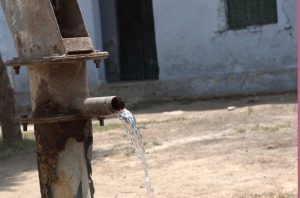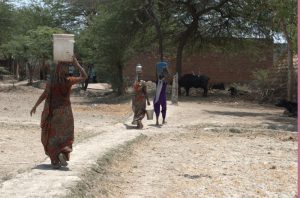Kesarghadi Drinking Water Project
Kesarghadi Village in Mathura, Uttar Pradesh is located merely 12 kilometers away from the Yamuna river. The groundwater in the village is severely contaminated with fluoride, nitrate, lead, calcium, magnesium, iron, and has a TDS limit of over 6000 mg/l. This forces the 108 households of Kesargahdi to walk up to 4 kms one way to secure clean drinking water from hand-pumps located in other villages. In collaboration with its team of water experts, PUCCA has conducted an extensive survey to assess the levels of ground-water contamination in Kesargadhi Village. Water samples were collected from three separate hand-pumps located in the village and adjoining areas and tested in a laboratory. Results of the water testing have indicated that contaminants in the ground water include chemical and mineral contamination above permissible limits. PUCCA is undertaking a feasibility study to assess solutions that can be implemented to provide clean drinking water to households and also improve the quality of ground-water through the revitalization of the natural water bodies.
Rationale and Scope:
- 100 percent of all households in Kesarghadi receive water for domestic consumption from an untreated source.
- All of the groundwater located within a 4 km radius of Kesarghadi village is severely contaminated and is unfit for human consumption according to the national standards of drinking water BIS 10500 mandated by the Government of India.
- Level of total dissolved solids (TDS) in the groundwater in Kesarghadi is over 6000 mg/l, whereas the limit for potable water use is TDS>500 mg/litre.
In collaboration with hydrological experts, we are designing a solution to provide Kesarghadi’s residents with potable drinking water at the household level. Water will be drawn from the Gang Canal, the only source of fresh potable water located 1.5 kms away from the village, to provide residents with clean drinking water. Our proposed intervention will build a pumping station near the canal from where water can be pumped to the village and distributed to every household. Apart from this, we are also implementing a roof-top rain water harvesting project on the school premises, which can provide drinking water in the school as a demonstrative project to incentivize some of the more affluent residents of the village to implement this in their own individual capacity.

